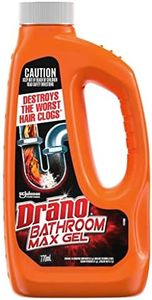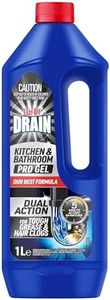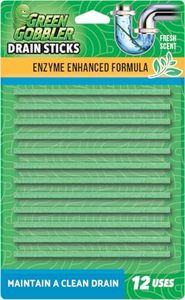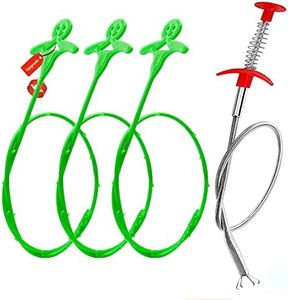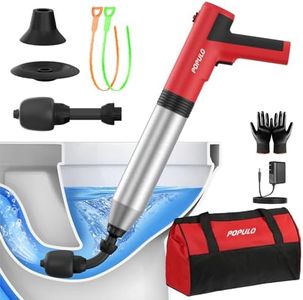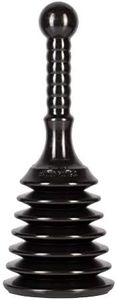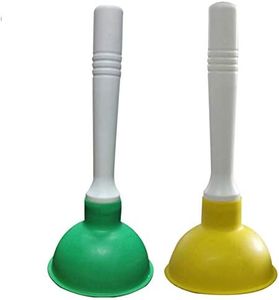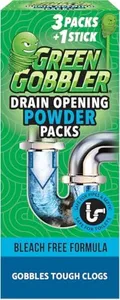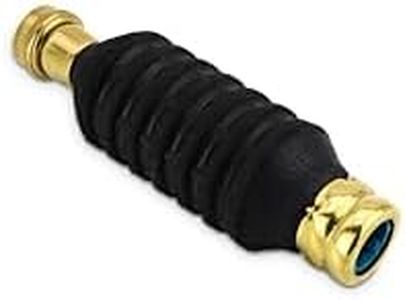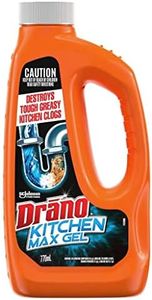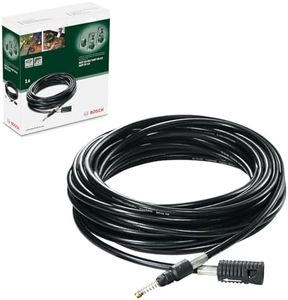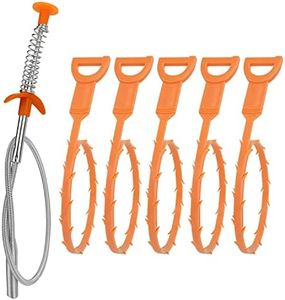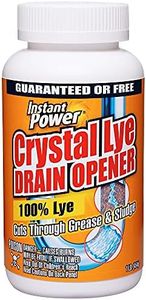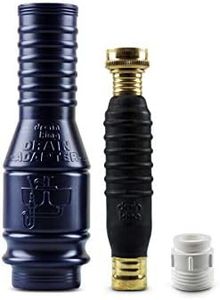We Use CookiesWe use cookies to enhance the security, performance,
functionality and for analytical and promotional activities. By continuing to browse this site you
are agreeing to our privacy policy
10 Best Drain Uncloggers
From leading brands and best sellers available on the web.By clicking on a link to a third party's website, log data is shared with that third party.
Buying Guide for the Best Drain Uncloggers
When you're faced with a stubborn clog in your sink, shower, or bathtub, picking the right drain unclogger can save you time, hassle, and sometimes even prevent damage to your plumbing. There are several types of drain uncloggers, each designed to handle particular situations. Understanding how they work and their main features will help you make a choice that's both safe and effective for your needs.Type of Unclogger (Chemical, Enzyme-Based, Mechanical, Natural/Home Remedies)The type of drain unclogger is essentially the method by which the clog is cleared. Chemical uncloggers break down hair, grease, or debris using powerful substances, while enzyme-based options use natural bacteria or enzymes to 'eat' the clog over time. Mechanical tools, like plungers or drain snakes, physically dislodge blockages, and natural/home remedies (such as baking soda and vinegar) are gentler and eco-friendly. Choosing the right type depends on the nature of your clog (organic vs. inorganic), frequency of clogs, and your concern for pipe safety and environmental impact. For minor or regular maintenance, enzyme and natural options are ideal; for tougher or emergency clogs, chemical or mechanical solutions may work better.
Safe for Pipes and Septic SystemsThis spec tells you whether the unclogger is formulated to avoid damaging your pipes or septic system. Some harsh chemicals can weaken certain materials like older metal pipes or harm the beneficial bacteria in septic tanks. Usually, products will state if they're safe for all pipes or septic systems. If you live in an older home, have plastic pipes, or use a septic tank, it's crucial to pick a product that specifically says it’s safe for those uses to avoid long-term plumbing problems.
Speed of ActionDifferent uncloggers work at different speeds, from instant-action options that clear clogs in minutes to enzyme-based or natural solutions that can take hours or even overnight. If you need a quick fix for a totally blocked drain, a fast-acting chemical or a mechanical method (like a plunger) is suitable. However, if you’re dealing with slow drains or want to perform routine maintenance, slower-acting enzyme or natural solutions may be better and gentler on your pipes.
Form (Liquid, Gel, Powder, Foam)Uncloggers come in various forms, each affecting how the product works and how easy it is to use. Liquids and gels are popular because they can quickly pour through standing water and reach the clog. Powders need to be mixed with water and are sometimes less effective in heavily clogged pipes. Foams can expand in the pipe and provide thorough coverage. If you have standing water, a gel or liquid that sinks and targets clogs is often best; use powders only if recommended, and foams for routine cleaning or where buildup is deeper in the pipes.
Odor and Fume LevelSome chemical uncloggers release strong odors or even harmful fumes that can make indoor air unpleasant or require good ventilation. If you’re sensitive to smells or are using the product in a poorly ventilated area, look for options specifically labeled as low-odor or odorless. Enzyme-based and natural remedies generally have little to no odor, making them preferable for people with sensitivities.
Environmental ImpactMany people are concerned about the environmental effects of harsh chemicals going down the drain. Some uncloggers are biodegradable and do not harm water systems, while others can be hazardous to aquatic life. If environmental safety is a priority for you, seek enzyme-based or clearly marked environmentally friendly uncloggers. Otherwise, use powerful chemical options sparingly and only when necessary.
